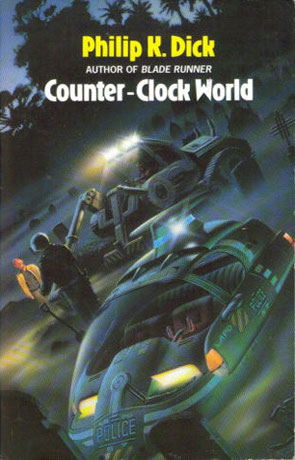
“And music shall untune the sky.”
Counter-Clock World is built upon a simple idea: the reversal of biological time (but not the reversal of time itself). Expanding on his own short story called “Your Appointment Will Be Yesterday” Philip K. Dick hits all his usual sweet spots with regards to racial tensions, marital infidelity, divine revelation, prophecy, social taboos, the uncanny valley, drug-induced paranoia, hallucinations, etc. He explores these through a typically slapdash narrative built upon the concept of aging backwards and centered on the impending resurrection of a popular religious figure.
In this backwards world, the universe has entered the Hobart Phase, a new order of life in which the deceased rise from their graves and grow younger year by year. Bodily processes are reversed and in turn the cultural customs surrounding them are as well. E.g. friends will enjoy anally-consumed pipes of “sogum” in one another’s presence, but will retreat to private quarters to undergo “victual momentum” (i.e. vomit), effectively reversing the normal processes of eating and defecating. Cigarettes are not smoked but blown back together in an effort to remove pollution from the air. Conventional greetings and farewells are reversed. “Food” becomes the explicative of choice. And when a person de-ages to a sufficient degree, they must find a womb to crawl into for a nine month voyage to their final “birth.”
At the center of the conflict is the destruction of knowledge, works of art, etc. I read the book across the span of several nights just before bedtime (PKD’s works often perfectly straddle the serious/silly divide, keeping me engaged enough to avoid boredom but never asking me to really sink my teeth in; which means they do a wonderful job of inducing a sleepy, dreamy state) but from what I can recall, there isn’t a solid explanation as to why knowledge must be destroyed. It’s just like, well, everything’s going in reverse, so we have to start removing works of art and scholarship in reverse order of their creation. Inconsistencies like this one are detrimental to the world’s plausibility but are easy to overlook once you’ve got a feel for what Dick’s conjured up.
You know, when you wake up in your coffin you first feel a weird fatigue. Your mind is empty; your body does nothing. Then you have thoughts, things you want to say, acts you want to perform. You want to yell and to struggle, to get out. But your body doesn’t respond; you can’t speak and you can’t move. […] It’s the worst experience I’ve ever had. Much worse than dying.
In any case, the Library is a feared institution that will stop at nothing to eradicate information. They employ gun-toting agents (some of them de-aged children) and will often interrogate and harass people to ensure that nothing escapes their grasp. Sebastian Hermes, the owner of a mom-and-pop Vitarium, becomes tangled up with the Library when he sends his wife there to research various religious figures; among them Ray Roberts, the current head of the Rastafarian-cum-Roman-Catholic religion known as Udi, and the Anarch Thomas Peak, the religion’s founder. Sebastian’s “Vitarium” operates more or less as an ICU/marketplace for the newly old-born. He has a team of experts who can sink breathing shafts into buried coffins, offer religious counsel, broker deals with the highest bidder, etc. Everyone is interested in the Anarch because masic math skills indicate his resurrection is imminent, only, no one knows where he was buried—except the crew at the Flask of Hermes Vitarium. And of course nothing goes smoothly. Employees let the secret out, various interested groups make attempts to bribe Sebastian or infiltrate his operation, and so on. When Sebastian’s wife is held in the bowels of the Library, a macho policeman named Joe Tinbane rescues her and momentarily steals her heart away from Seb.
The plot contains several vintage PKD thrills as factions with wildly different plans for the Anarch vie for control of his freshly exhumed person. There are also several quality PKD asides like using the Bible for bibliomancy, a discussion on the mortification of the flesh, a reference to Lord of the Rings, and so on. The most entertaining action sequence is unquestionably Sebastian’s infiltration of the Library to rescue the Anarch; he enters equipped only with an LSD hand grenade and a time-dilution serum that dilates the Hobart Phase and slows everyone else down to such a degree that Sebastian is basically invisible to them if he keeps moving.
Like any book that’s rushed out in a drug-addled frenzy, Counter-Clock World contains a number of flaws. But it’s impossible to deny the author’s creativity and breathless delivery of his ideas. Consider that he was writing something like three books/year in the 1960s and the nearly great quality of many of them is actually quite staggering.